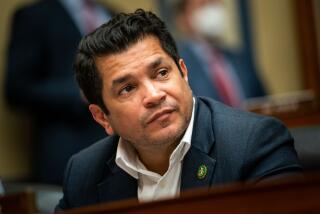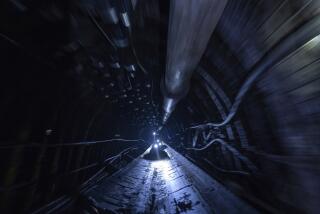Walkouts by Coal Miners ‘a Scream of Despair,’ Soviet Parliament Told
- Share via
MOSCOW — Widespread strikes by Soviet miners are “a scream of despair,” a member of the Supreme Soviet Parliament declared today in a startlingly frank debate televised across the country.
Kremlin leader Mikhail S. Gorbachev, who listened patiently to the entire debate, acknowledged that the walkouts had struck “a serious blow to the economy.”
Other deputies to the Parliament warned that the strike movement could quickly spread to other industries and said that, despite a slow return to work in the coal mines, social tension remained high.
“This was a scream of despair,” declared Yury Golik, a law lecturer and deputy from the city of Kemerovo in western Siberia’s Kuzbass coal basin where strike committees took control two weeks ago, bringing the mines to a standstill.
“Explosions have started, and we can expect a chain reaction,” said Alexei Boiko from the Donbass in the Ukraine.
Soviet President and party chief Gorbachev, who has issued three appeals for a return to work in the mines, looked on.
The assembly was summoned into emergency session as tens of thousands of miners remained on strike in several key coal-producing regions.
“People have been pushed onto the streets not by a shortage of soap, but by a shortage of justice,” Boiko said.
“The miners of Donetsk trust nobody and nothing. This is what we have come to. . . . There is no defense, not from the work councils, not from the unions, not from the party committees. There is no defense, and that’s an end of it.”
Nikolai Fyodorov, a young deputy from the west Ural industrial city of Cheboksary said: “This is not just the working class striking. This is the whole people showing they have been led into despair.”
The dramatic portrayal of the extent of worker discontent over the failure of Gorbachev’s perestroika reform program to bring immediate improvements in their lives came in an emergency debate on the mine strikes.
Despite a televised appeal from Gorbachev on Sunday and another warning at the start of the debate today of the possible effect of further stoppages on the ailing economy, tens of thousands of miners remained on strike.
Miners in the Kuzbass region in Central Asia went back to work over the weekend after a Kremlin commission agreed to meet most of their demands--including supplies of consumer goods and food, extra shift payments and local control of mine profits.
Deputies said today that local financial control had to be granted quickly in other industries to head off further unrest.
“Unless financial independence is granted to other branches of industry, they could all rise up as well,” one speaker, who said he had visited several key industrial areas, told the assembly.
Gorbachev and Prime Minister Nikolai I. Ryzhkov, who came under implicit fire from several deputies Monday, have pledged that the Kuzbass settlement will be applied to all other coal fields.
But economists say the agreements could stretch the country’s already ailing finances close to the breaking point.
More to Read
Sign up for Essential California
The most important California stories and recommendations in your inbox every morning.
You may occasionally receive promotional content from the Los Angeles Times.













